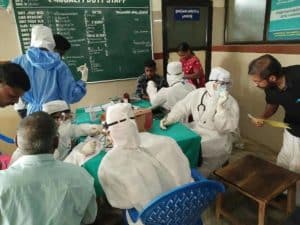10 people in Kerala, a southern state in India, have been confirmed dead as a result of the deadly Nipah virus (NiV), said to have been spread by fruit bats. The Nipah virus was first identified in 1999 when pig farmers in Malaysia and Singapore fell extremely ill because of close contact with pigs that carried the disease. Over 300 people contracted the disease, and 100 people died, prompting the governments to order the euthanization of more than one million pigs to stop the spread of the disease. The extreme action resulted in significant trade loss in Malaysia, but since the initial outbreak, there have been no reported cases of Nipah in Malaysia or Singapore. However, Nipah virus infections have been reported annually in Bangladesh and several times in India since then.

What is the Nipah Virus?
This newly emerged virus is a member of the family Paramyxoviridae, genus Henipavirus. The pathogen can cause severe illness and death in both animals and humans, and transmission is spread via direct contact with an infected animal or person. The infection is linked to encephalitis (inflammation in the brain). Symptoms characterized by fever, headache, respiratory illness, drowsiness, mental confusion are associated with the disease. In some reported cases, individuals have slipped into a coma within 24-48 hours of contracting the disease.
There is no cure of this rapidly emerging disease, and with a 75% mortality rate and lack of a viable pathway for treatment, the World Health Organization classified the pathogen among the top ten priority diseases to watch requiring urgent research and development. For those that survive the disease, the CDC says that long term effects can include severe personality changes and convulsions.
What is happening in Kerala now?
13 more individuals have tested positive for the disease, and over 100 have been quarantined inside their homes. Without specific medicine, treatment is limited to supportive care.
India’s national Health Minister, J. P. Nadda, wrote on Twitter on Wednesday that he had instructed officials, “to leave no stone unturned in terms of proactively countering the Nipah virus threat.”
To avoid transmission, health officials urge citizens to “avoid direct contact with bats or sick pigs and to not drink the raw date palm sap” which can be contaminated by infected fruit bats.
